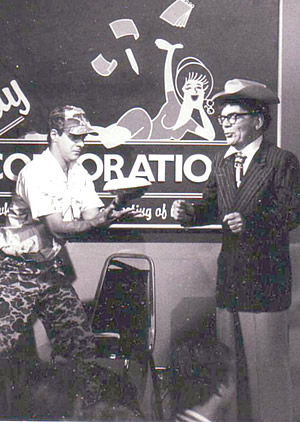
Preparing to launch a pie at his father “Icky Twerp,” Fredericksburg resident Paul Camfield appears as Mossback (left) during a show commemorating the 30th anniversary of Slam Bang Theater in Fort Worth.
Sept 9, 2009–Kids in the 1950s and 1960s rushed home after school and turned on their televisions to watch shows designed just for them. Depending on where you grew up, your afternoon TV host might have been Dr. Max, Captain Ernie, Buckaroo Bob, or Marshall Jay.
If you lived in Fort Worth, you watched Icky Twerp.
Ichamore Twerpwhistle was the brilliant creation of Bill Camfield, a creative writer who found himself working as promotions manager for independent KTVT-TV (Channel 11) in the 1950s.
Camfield’s memory is being kept alive in special way this September (2009), as his son, Paul Camfield of Fredericksburg, is working with Dallas public access television station iMedia on a retrospective set for Sept 26, the 50th anniversary of the debut of Slam Bang Theater.
Camfield’s Icky Twerp was ahead of his time. Rather than going for some outrageous persona, Camfield made Twerp just slightly off center. He wore an outdated brown suit, and a too-small cowboy hat perched atop a scraggly black wig.
He was a trained actor and voracious reader. His skits often contained references to great literature and obtuse puns (in one skit he dined at the “Toe Main” restaurant).
Like all early children’s shows, Slam Bang Theater was a collection of slapstick skits and improvised bits produced to introduce cartoons and Three Stooges shorts. The show featured sidekicks in gorilla suits, hand-drawn scenery on backdrops of brown paper, and lots of pies in the face. It all erupted from Camfield’s fertile mind. He was responsible for 2 and 1/2 hours of daily programming five days a week. He created a stable of characters, including Mortimer Moolah, Cosmo the Clown, Hoover the Movie Hound, and Gorgon, who hosted the Nightmare horror movie. Gorgon’s signature laugh still haunts his grown son.
Kids loved it. During the later runs of the show, Twerp would draw 5000 youngsters to his public appearances. Heady stuff for the son of a West Texas coal miner. But life behind the scenes was not all posing and pratfalls.
Camfield led a compelling life, torn between talent and tragedy. He grew up dirt poor, and never was able to parlay his TV success into financial security. He lost his wife to suicide, his teenage daughter to a car wreck, and battled and triumphed over personal demons, dying at 62 of brain cancer.
Paul Camfield has reached resolution with all sides of the story, and today sees the positive effect his father had on a generation of television viewers. Every day he receives comments from contemporaries who remember the joy and fun Icky Twerp delivered during their growing up years.
“All my emails say the same things, that this meant so much to them and was such a big part of their childhoods.” He is also surprised to discover there is interest from today’s younger generation. “When we were showing people in their 20s the rushes from the documentary, they were blown away with the reality of it. So this is not just nostalgia for boomers.”
Paul was fortunate to be able to grow closer to his father as an adult. He has only one regret, if you could call it that. When I asked him if he had any question he’d like to ask his father, Paul falls uncharacteristically silent.
Finally he speaks.
“I would have loved for him to see my kids in their theater and dance performances. When I watched my youngest perform in a play, I was just crying like a baby. If dad had been sitting in the audience that night, he would have been bawling too. It was just beautiful to see that, yes, they do have a little of that in them.”